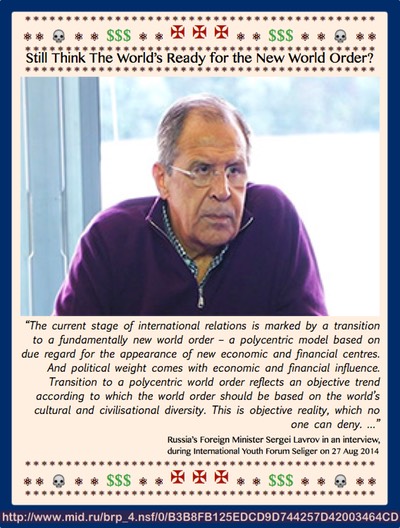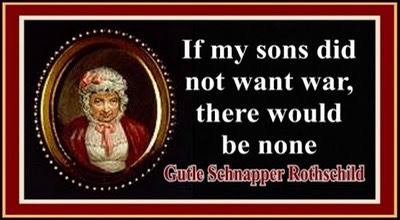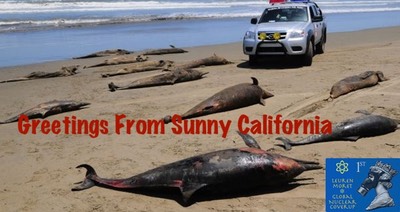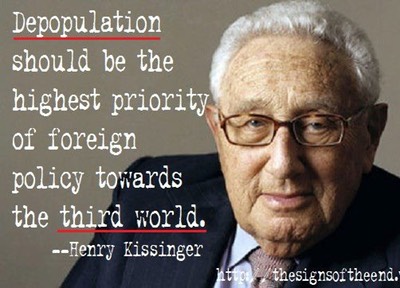Pravy Sektor vs. The Kiev Junta
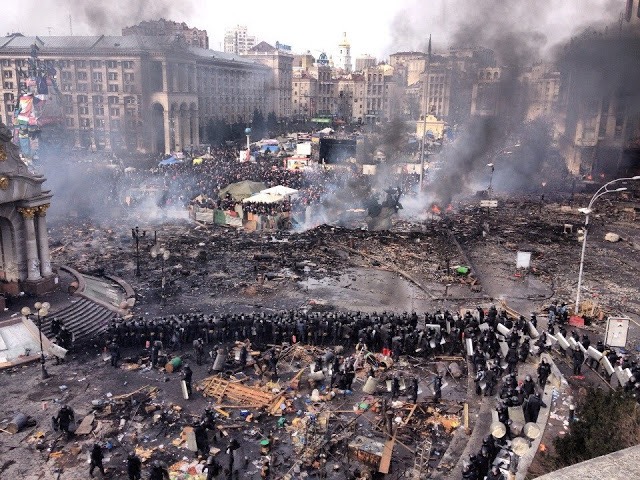
July 13th, 2015 | Analysis by: Joaquin Flores
In Rostislav Ishchenko's latest brief titled: К событиям в Мукачево (The Events in Mukachevo), he gives us his view of what the headline grabbing situation in Mukachevo represents, what can be gained or lost from it, what is behind it, and what the potential outcomes of it can be.
Ishchenko has given some good ideas, and some of the dynamics he describes are useful. Problematically though is that the foundation of the ideas in his brief rely on several fundamentally wrong assumptions about the way the US operates, what its goals are, how it understands power, and of course the question of who is behind the pravy sektor in the first place. This also places into question the entire understanding of the events leading up to and following the coup, and how the US orchestrated some things and yet was forced to react and compromise on others.
First it is important to include that in many cases it is generally not generous to critique a brief for the things it does not include. On any given subject, there are many variables which a brief cannot possibly cover. But underlying assumptions are evident in his piece, and furthermore by enumerating the options which lead to definite predictions, these seem to exclude other variables by not including them. Upon reflection, Ishchenko may even agree with elements of this rejoinder brief - which hopefully can be read by all as an addendum.
To understand what is incomplete in the Ishchenko brief, and what can be added, first we will look precisely at what was stated.
To summarize Ishchenko's view, he essentially provides this: The fact that the Pravy Sektor and the Kiev Junta are having an open conflict is both inevitable and good. We are given three possible outcomes:
1. Suppression of the Pravy Sektor
2. The Overthrow of Poroshenko
3. A Temporary Compromise
It is stated that the third is not so good, but will inevitably lead to either 1. or 2. because the 3rd option only puts off the inevitable for a temporary amount of time.
He is optimistic about these developments because in the case of 1., then the Kiev Junta loses support of the Pravy Sektor, and because the war effort relies on their support, the Junta's (i.e. Poroshenko's) war efforts are doomed to fail.
In the case of 2., it is stated that this will lead to the establishment of a "Radical Nationalist Dictatorship", which neither the US or Europe will be able to ignore.
In either event, whatever government results, it will not have support from key constituencies which it requires to pursue the war effort, or to maintain governmental functions.
He concludes in his bottom line, point 6:
6. In addition, this incident demonstrates that even the Americans can not keep the situation under control.
His last bottom line point refers back to the three possible outcomes.
What is missing from his brief is the 4th option:
☞ Both Sides Continue Hostilities with No End in Sight ☜ .
This will lead towards an increase in the rate of deterioration of the situation, and general instability. This is what the US may in fact want.
Surely, it can back both the Kiev Junta and the Pravy Sektor and any other faction that wants to get in on the free for all, so long as it makes Ukraine an unworkable project, and economically useless - in fact rather a total liability - to Belarus and Russia.
The Belgrade based public NGO, Center for Syncretic Studies was the first to detail the dynamics of this strategy.
Ishchenko operates from the premise that the US supports or controls Poroshenko, but does not control the Pravy Sektor, and this view is not corroborated either by theory or by the way that the US has operated on the ground.
To understand the actual mechanics, we must explain the following:
The National Endowment for Democracy and Radio Free Europe and its brand 'Radio Liberty' also called 'Radio Svoboda' is the foreign backbone for the Svoboda Party of Ukraine.
The Svoboda Party is the rebranding of the Social-Nationalist assembly. A legal party during the pre-coup regime, such as Svoboda cannot have an armed militia within the framework of legal institutions. This legal party is nominally led by Oleh Tyahnybok.
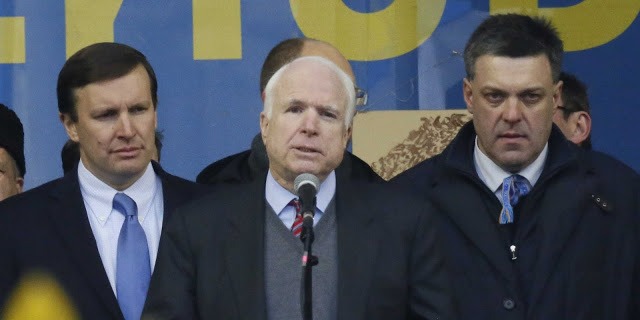
McCain speaks, Tyahnybok on his right. An appearance similar to his impromptu FSA support meetings in Syria.
To reconcile this, the US urged the Social-Nationalist assembly groups that did not form under the Svoboda Party brand to maintain independence. They continued with paramilitary training and preparation. In the period leading up to the coup, they were re-organized in a unified way that the Social-Nationalist assembly had done, under the umbrella brand 'Pravy Sektor'. This is led by Dmytro Yarosh.
The US exerts total control over Svoboda, and uses its 'hawk' wing (McCain, et al) to support them publicly. Covertly they support and control the Pravy Sektor through numerous proxies, in-country oligarchs, and various charitable foundations run by fronts.
The US exerts the least control over Poroshenko - although to be clear, they had the most control over him and more so over Yatsenyuk, when compared to other relatively mainstream, i.e. electable people.
The EU also apparently favored Poroshenko, and the May 2014 elections, and the placement of Poroshenko came a whole phase later, a phase which was shaped by two events:
1.) February 2014 - Following the previous marginalization of the EU, the US going against the EU's compromise with Russia to resolve the crisis peacefully with new elections, infamously characterized with Nulands 'f*ck the EU' statement.
2.) March 2014 Crimea surprise - Following the Crimeans' vote to separate from Ukraine and join Russia, signaling a robust and clear Russian response.
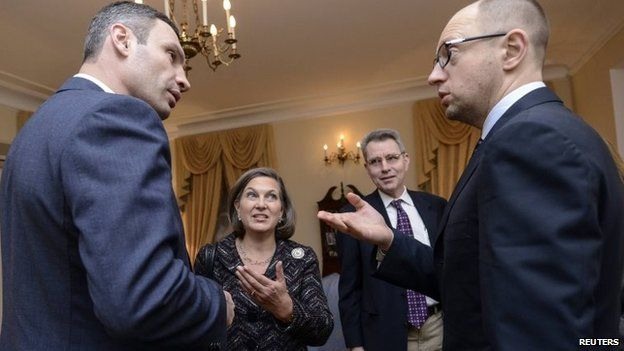
Yatsenyuk and Klitschko: Nuland's favorites
The US initially favored Yatsenyuk and Klitschko. That is what the leak clearly indicates from Nuland's conversation.
Klitschko was the link between Tyahnybok and Yatsenyuk. Tyahnybok was scripted to play the 'radical' who pressured the 'responsible' Yatsenyuk and Klitschko. The 'violence' of Yarosh must be separated by two links from the 'responsibleness' of Yatsenyuk.
Tyahnybok is the link between Yarosh and Yatsenyuk. Tyahnybok's leverage on Yatsenyuk would be - in the script - a reasonable response to placate or ameliorate the violence of Yarosh. In reality, all three are team USA.
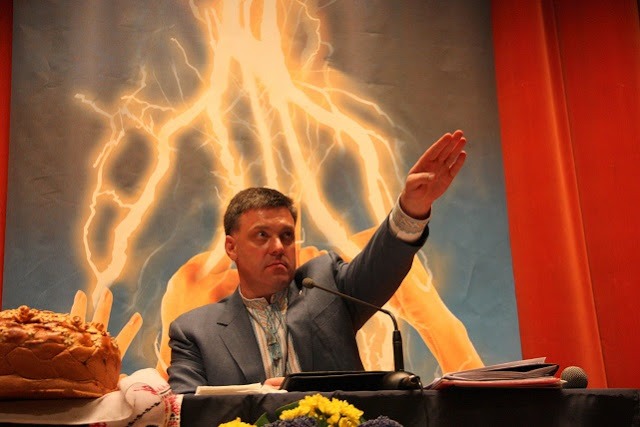
Tyahnybok doing what he does best
But the two formative events, above, made this unworkable. To reformulate the plan, the US had to go back to the EU and make a compromise. The EU also could not make a compromise without some indication from Russia that such a compromise would be acceptable.
So the US was pushed back to the EU-Russia agreement of 'new elections'. However, they still had the upper-hand because there were new facts on the ground (the coup, new radical formations emboldened, a new narrative, etc.).
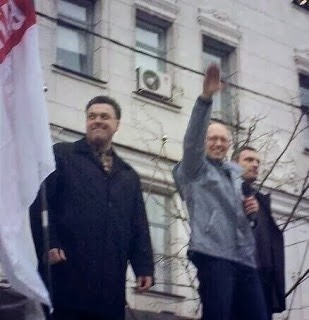
Tyahnybok (l), Yatsenyuk, Klitschko Saluting the Praetorian Guard? Probably not.
In that sense, it was not the old agreement which the US had already 'f*cked', but a new agreement which merely resembled the old agreement.
Poroshenko was the candidate which the US, EU, and Russia could agree to. That Russia did not recognize the elections in Novorossiya the way they had with Crimea was their 'proof' that they were on board with the Poroshenko compromise.
This fact is not widely publicized or discussed, and works against popular pro-Russian sentiments and memes, because of the war-crimes and crimes against humanity that Poroshenko subsequently became responsible for.
Russia would proceed to, in a surprisingly warm tone (in the language of international relations), through Lavrov, 'welcome' and recognize the May 2014 Kiev elections as legitimate, even though the constitution provides that it is not. It was not really legitimate by Ukraine's own constitution due to the lack of participation of the rebellious regions, the de-facto martial law, as well as other factors.
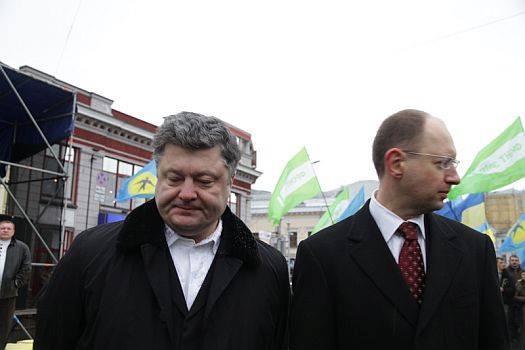
Poroshenko and Yatsenyuk - newlyweds already having doubts.
The best analogy for Poroshenko, then, is the EU (not the US) - caught in a tug of war between the US and Russia, but also trying to look out for and define his own interest in the game, all the while being threatened with destruction.
It is most likely that Russia had no illusions that Poroshenko would also be compelled to try to push Russia into a premature or unpopular (in Europe and Russia) intervention. But Poroshenko was more committed to the semblance of normalcy and order - at least west of the Dnieper River - and was inclined to make numerous deals with Russia - including accepting coal and gas subsidies - all to maintain some modicum of a society, even with seriously eroded democratic, civil, pluralistic norms.
Ishchenko's brief, on the other hand, reduces these complexities, recognizes the US's support for Poroshenko, but does not consider either the degree of support, how it came about, or the way that the US uses the Pravy Sektor as well.
The brief results in perhaps an opposite conclusion than it should.
Now we return to Ishchenko's bottom line, point 6:
6. In addition, this incident demonstrates that even the Americans can not keep the situation under control.
American practice on these matters, in light of the Color-Spring tactic is the role of creative destruction, control through chaos, surfing catastrophe. Ishchenko seems to operate purely from a Color Revolution understanding of the situation.
We can summarize Ishchenko's understanding as this: The US backed a Color Revolution in Ukraine to get 'its government' (Poroshenko and Yatsenyuk) into power. It used 'useful and violent idiots' of the Pravy Sektor to help with this. They served that purpose, and also a purpose in the war - but now they threaten to go rogue and do things the US does not want them to do.
This is not correct. So far we have discussed two US plans, one before the two formative events listed above, and one after. Both plans rely on total control of the Pravy Sektor as a hedge against any government that thinks that it might do something sane like stop the war, or pursue it half-heartedly.
Ishchenko seems to ignore the last four years in the evolution of the Color Revolution tactic into the Arab Spring tactic - which relies both on a Color beginning, but then transforms a civil opposition into an armed uprising (the FSA) and then creates a distinct force which it also controls like Al-Nusra, ISIS/ISIL and similar Al Qaeda type proxies.
This author was the first to explain that the Pravy Sektor are the "Wahhabis" in the "Ukrainian Spring".
The goal in this strategy is not to effect some 'transition of power', but to make power itself impossible. It is not to change the government or its commitments, but to make government and commitments impossible to effect.
The Orange Revolution and the experience of Yulia Tymoshenko illustrate this point in the negative. Even after this traditional Color Revolution tactic was effectively employed, the overall strategy was frustrated by natural tendencies. Despite a rhetorically and culturally anti-Russian government, the actual policy of Tymoshenko actually engendered an increase of Ukraine-Russia bilateral trade. She is accused of possibly taking bribes from Gazprom officials for making a deal with them that was, perhaps, too good for Gazprom.
Whatever government there will be - even Poroshenko is evidence of this - will rely on Russia. If it also has something that it produces, any export at all, then Russia will benefit from this as well. This natural tendency, under regular peacetime norms, will bring different players to the table. The pragmatic tendency will be for any functioning Ukraine to drift back into the Russian sphere of influence.
Recall that in early February 2015, the US warned that "if Poroshenko and Yatsenyuk walk the path of Yushchenko and Tymoshenko, they will 'wash their hands' of them". That path was having any kind of normal relations with their largest trading partner, Russia.
That is why there must be a war. This is not about regime change, but about destabilization. The Pravy Sektor are US agents of destabilization. When they take up arms against the Kiev Junta, they are performing their specific role, which is the opposite of going rogue.
As to Ishchenko's conclusion that whatever outcome will be 'good'. That is possible, but also debatable. Russia certainly has numerous contingencies in play, and enough time has gone by, and several events have unfolded, which tend to favor it over all. But this is separate from what Ishchenko seems to have in mind.
It is quite strange that the idea that Ukraine could become a Radical Nationalist regime would be something the US could not ignore, in the sense that this would present some problem for the US on ideological grounds. Europe may have a harder time selling this to the various publics within each European country, but this is still workable insofar as Europe is more finely tuned in the art of sitting in two chairs, opposing things in words which they support in policy, and other duplicitous ways of implementing policy.
It is logical that the US would not establish a Radical Nationalist 'regime' in Ukraine - but not for reasons that Ishchenko thinks; not for its radicalism or nationalism, but for its governmental role as a 'regime'. Regimes, at any rate, are relatively stable until the US makes them failed states. The problem for the US is stability, regardless of the governmental form.
The US has in fact put into power any number of radical nationalist, or authoritarian dictatorships, all around the world. It hasn't even arguably done so in Europe since the 1930's. But what Ishchenko may not understand is that, even with this, Ukraine is not considered Europe and never will be. Ukraine is up for standard colonial 3rd world treatment.
However, the US will not install a Pinochet, whether his name is Yarosh or Tyahnybok or Yatsenyuk. Despite his crimes against humanity, and a program of austerity and privatization inspired chiefly by the Chicago School of Economics and the Austrians, Chile was not a failed state in any sense of the word.
Thus in viewing Ishchenko's 'point 6.', rather than "this incident shows that even the Americans can not keep the situation under control", it is the opposite: the Pravy Sektor is one American method of keeping the situation under control.
But if one confuses stability for control, then they would have lost the plot. Instability and failed states is one of the most favored US methods of maintaining control.
If we consider a '4th' possible outcome, adding to Ishchenko, that would be the one that best suits the US if it cannot compel the government of Poroshenko to resume major hostilities in the east of former Ukraine. The Pravy Sektor is their vehicle to create that mayhem.
This could bleed into, and spin off into, any number of directions. Transcarpathia, Transdniestra; it could pull in Poland as the Pravy Sektor's conception of greater Galicia includes parts of Poland. Crimes against the minority Hungarian population in Ukraine's west could pull in Hungary. From here, so many more variables would be then included, creating the perfect recipe for the kind of 'creative destruction' which the US prefers.
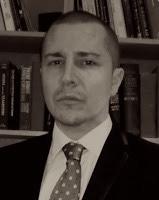
Joaquin Flores is a Mexican-American expat based in Belgrade. He is a full-time analyst and director at the Center for Syncretic Studies, a public geostrategic think-tank and consultancy firm, as well as the co-editor of Fort Russ news service, and President of the Berlin based Independent Journalist Association for Peace. His expertise encompasses Eastern Europe, Eurasia, and he has a strong proficiency in Middle East affairs. Flores is particularly adept at analyzing ideology and the role of mass psychology, as well as the methods of the information war in the context of 4GW and New Media. He is a political scientist educated at California State University. In the US, he worked for a number of years as a labor union organizer, chief negotiator, and strategist for a major trade union federation.
http://fortruss.blogspot.com/2015/07/the-ukrainian-failed-state-pravy-sektor.html
Analysis Arab Spring Best of Fort Russ Civil War Color Revolution failed state Feature Flores Ishchenko Kiev junta Poroshenko Pravy Sektor Tyagnibok Ukraine Yarosh Yatsenyuk
Visitors to LM:GNC
Leuren Moret: Global Nuclear Coverup
- ❁ Currents
- ⚛ Radiation Omnicide 👥
- 🎥 UC, Davis, Katehi, Illuminati ✠
- 🌎✟☦ One World Religion 🎭
- ♞ Atlanticists v. Putin et al ⚪️
- ✈️ 3 NWO False Flags Connected ➷
- 🔪Ukrainian ✠ Wikileaks 👀 Interview 🎥
- 🚫 Out of Eurasia 🚫
- 💀 Jade Helm, International Implications, NWO Rollouts ⏰
- 🌿 Essential Oils, Nutrition, Frequencies & Health 🌺
- 🎯 R.F.D.E. | H.A.A.R.P. | N.L.P. ⚡️
- ⚛ Leuren Moret: Hiroshima, Nagasaki, Fukushima ⚛
- ❦ Moret & Battis: Jade Helm ❦
- 🌎 New World Order America 🇺🇸
- ⨳ Geopolitics Ukraine | E.U. Judo 🌍
- 👥 Template: Jade Helm
- ✠ America’s Domestic Pacification ✠
- ♨️ Chernobyl, Zaporozhye, Blackmail ⚛
- 💉 REBRANDING DISASTER🔪
- 👤 Eurasian Enigma Arises
- 🔴 Donetsk Nuclear Explosion ⚫️
- 🌍 21st Century Silk Road 🌏
- 🌍 Africa ☗
- ♞ Balkans, The Nameless Triangle
- 🌏 China 🌝
- 🌍 Eurasia 🔴
- 💣 Israel: Out of Erupt!
- ✠ Jesuits/Templar’s Origins & Aims
- 👺 SOROS ✠ NWO 📚 Hacked ✍
- ➴ Pyatt’s ✠ SOROS ♞ Breakfast 🍳
- Breedlove, GOOD RIDDANCE
- 🎱 Obama’s $3 Billion Eurocon 💸
- 🌍 A Psychopath’s Psychopath ✠
- 🔫 Global Hit Squad 💣
- 💀 Neo-Capitalist’s Slave Trade 💰
- 🇺🇸 Bio: Undermine Control
- ↷ Fine Evening For A Minuet ↶
- ✠ Slavery, Then & Now
- 💣 JCS Operation Northwoods
- ✠ The Three Secret Meetings
- Korea Yeonhee (연희) Nuclear Kabuki Theatre
- 🌍 Middle East 💣
- 💣 ISIL: Battered, Retreating 💀
- 🔥 Turkish Coup Attempt 💣
- ⚑ Muslim Brotherhood and ISIS ⚫️
- 🔫💰💉Daesh Terrorist Multi-Tool🔪💣💊
- 🚧 US and Turkey, NWO the Kurds 💸
- ✠ Hitler Bragged on Jesuits ✠
- 🍞 Their Daily Bread & Rubble 💣
- 🔪“Erdogan is Strengthening ISIS”💣
- 🇫🇷 Russia Reveals ISIS’ Money 💰💰
- "Raqqa's Rockefellers” ISIS Full Frontal
- ☞ Smashing Turkey’s Game❌
- 🌍 Juncker | E.U. | Direction ⤣
- 🔪 GLADIO Wolf Kills Russian Pilot ✈︎
- ✈︎ Washington’s SU-24 🎯
- 🌐 Turkey, NATO, War Crime? 🔎
- ➷ 449-Down, ISIL to Go 💣
- 🌎 North America 🔥✠
- 🇷🇺 Russia 🇷🇺
- 🇷🇺 PUTIN OVERHAULS KREMLIN 🏰
- ☛ Who Created ISIS ☚
- 🍳 Food Supply Compromised 🎱
- 🌍 Putin re Ceasefire Syria 🌐
- 👤 Cold War Re-Run 👀
- 🌐 Minsk 101 | Theatre of the Absurd 🌍
- 🌐 Geopolitical Original Sin 🌍
- ♘ Russian Troops | Turkish Border ♘
- 📚 Educating Charlie Rose 🔑
- 🌍 Lavrov's Munich Speech
- 🎱 US Embassy Media Fail 🎭
- ✠ ♛🃏 Putin’s Jar Of Spiders
- 🎱 MOSSAD’S ON THE DOORSTEP 💣
- 📄 This Document is Dynamite 📄
- ♔ The Golden Trap
- ❁ Russian Fusion-Fission
- ❁ Putin’s 7-Point Plan
- ❁ Russian Position Speech
- ✈︎ Ukraine, MH-17, Jesuits Flagged! BRICS Undermined?
- ⏰ Ukraine? 🔥 Bail Out! ✈️
- 💦👤 Psychotropic Zombification ☔️
- 💣 Odessa Trade Union Murders 🔥
- 🃏 Nothing Personal, Just Business 💰
- 💉 BioWeapons for Depopulation 💀
- ⚛ Nuclear Coverup Ukraine | Mines of Zholti Vody 💀
- 🔥 Unsustainable Ukraine 👥
- ☗ ASHES TO ASHES 💀
- 🔪Ukrainian Wikileaks 👀
- ☞ Dispatches From the Front 🔫
- 💣 The Ukrainian Failed State 🌍
- 🔑 Our Decisions Define Us🔑
- ✠ Child Abuse 💀
- 💣 Mozgovoi’s Murder 🔪
- 🎱 Yatsenyuk's Russian Threat 🔮
- ||| Prison Ukraine |||
- ✍ CyberBerkut Reports 👥
- ♨️ Crazy Arseniy’s -USED- Ukraine Fire Sale! ♨️
- ✝ AZOV CRUCIFIXION ✝
- 👤 Eyewitness Debaltsevo Cauldron 💀
- ✍ Historic Slaviansk Doctor Interviewed
- 💀 The Tragedy of Uglegorsk
- ♟ Jan. 2015 Minsk Fail 🃏
- ➷ Tochka Found, Debaltsevo Locked
- 🌍 World Facing Second Chernobyl
- ✈︎ MH-17 AND THE Jesuit Minuet
- ✈︎ MH-17, Jesuits Flagged!, Video
- 💀 Death’s Drummers
- 👤 DPR! Novorossiya Calling
- 💀 Ukraine’s Chernobyl Armor
- 🎱 Gas to Ukraine Blocked
- ❁ Global Nuclear Theatre: Donbass
- ✠ GHOSTS of the 51st BRIGADE
- ❁ Novorossiya: Strelkov Briefing
- 👤 Open Letter to President Putin
- ✈︎ MH-17 Dutch Interim Report
- 💣 Surrendering UA Murdered by Punatives
- ♟ Mutiny of the Euro-Integrators ♟
- ➹ View from Ukraine Operating Room
- ❁ Ukraine’s Violent Escalation
- ❁ Ukrainian Soldier’s Cry for Help
- ⧱ Occupied Ukraine ⧱
- ❁ US State's Nuland Directs Ukrainian Coup
- 📯 Ukraine Deputies Knew Before Maidan
- ❁ Health In 2015
- 💉 Vaccines 💀
- 🎥 Geopolitics, Jesuits & History
- 🎥 Rebranded ✠ The Jesuits ✠
- ⚛ Zaporhyze Nuclear Events & Geopolitics
- ❁ Fukushima Polar Vortex Radiation ❁
- 💀 Embrace, Enfold, Extinguish
- ✈︎ Fear of Flying . . . (1of4)
- ❁ Fukushima: Impact of Fallout On Oceans (Pt.1)
- ❁ Fukushima: Impact of Fallout On Oceans (Pt. 2)
- ❁ North America, Middle East and Fukushima
- ❁ DHS/Napolitano Berkeley Template
- ❁ Fukushima Radiation, Ecocide & Tesla Technology
- ✈︎ Flight 370 Downing
- ✈︎ MH370: The Follow-Up
- ❁ Domestic Radiation Issues
- ❁ Fukushima: Hawaii, Pacific Is. - Unsafe
- ⚛ Fukushima Reactors, Breakdown 1-6 ⚛
- 🌏 International Sites Featuring LM:GNC
- ❁ On To Mongolia 🎥
- 🎥 LKM On Fairdinkum Media 🎥
- ❁ Editorial Page
- ❁ Conversations 📬
- ❁ Waves
- ⚛ Radiation Around The Nation 🌎
- ⚛ Your Radiation #73/74, Sep 10 - 24, 2016 🌎
- ⚛ Your Radiation #71/72, Aug 27 - Sep 10, 2016 🌎
- ⚛ Your Radiation #69/70, July 30 - August 13, 2016 🌎
- ⚛ Your Radiation #67/8,--July 16-30, 2016 🌎
- ⚛ Your Radiation #65-6,--July 2-16, 2016 🌎
- ⚛ Your Radiation #64, July 2-9, 2016 🌎
- ⚛ Your Radiation #62-3, June 18 - July 2, 2016 🌎
- ⚛ Your Radiation #61, June 11-18, 2016 🌎
- ⚛ Your Radiation #60, June 4-11, 2016 🌎
- ⚛ Your Radiation #59, May 28 - June 4, 2016 🌎
- ⚛ Your Radiation #58, May 21-28, 2016 🌎
- ⚛ Your Radiation #57, May 14-21, 2016 🌎
- ⚛ Your Radiation #56, May 7-14, 2016 🌎
- ⚛ Your Radiation #55, Apr 30 - May 7, 2016 🌎
- ⚛ Your Radiation #54, Apr 23-30, 2016 🌎
- ⚛ Your Radiation #53, Apr 16-23, 2016 🌎
- ⚛ Your Radiation #52, Apr 9-16, 2016 🌎
- ⚛ Your Radiation #51, Apr 2-9, 2016 🌎
- ⚛ Your Radiation #47-50, Mar 5 - Apr 2, 2016 🌎
- ⚛ Your Radiation #46, Feb 27-Mar 5, 2016 🌎
- ⚛ Your Radiation #45, Feb 20-27, 2016 🌎
- ⚛ Your Radiation #44, Feb 13-20, 2016 🌎
- ⚛ Your Radiation #43, Feb 6-13, 2016 🌎
- ⚛ Your Radiation #42, Jan 30 - Feb 6, 2016 🌎
- ⚛ Your Radiation #41, Jan 23-30, 2016 🌎
- ⚛ Your Radiation #40, Jan 16-23, 2016 🌎
- ⚛ Your Radiation #39, Jan 9-16, 2016 🌎
- ⚛ Your Radiation #38, Jan 2-9, 2016 🌎
- ⚛ Your Radiation #37, Dec 26 - Jan 2, 2015|16 🌎
- ⚛ Your Radiation #36, Dec 19-26, 2015 🌎
- ⚛ Your Radiation #35, Dec 12-19, 2015 🌎
- ⚛ Your Radiation #34, Dec 5-12, 2015 🌎
- ⚛ Your Radiation #33, Nov 28 - Dec 5, 2015 🌎
- ⚛ Your Radiation #32, Nov 21-28, 2015 🌎
- ⚛ Your Radiation #31, Nov 14-21, 2015 🌎
- ⚛ Your Radiation #30, Nov 7-14, 2015 🌎
- ⚛ Your Radiation #29, Oct 31 - Nov 7, 2015 🌎
- ⚛ Your Radiation #28, Oct 24-31, 2015 🌎
- ⚛ Your Radiation #27, Oct 17-24, 2015 🌎
- ⚛ Your Radiation #26, Oct 10-17, 2015 🌎
- ⚛ Your Radiation #25, Oct 3-10, 2015 🌎
- ⚛ Your Radiation #24, Sep 26 - Oct 2, 2015 🌎
- ⚛ Your Radiation #23, Sep 19-26, 2015 🌎
- ⚛ Your Radiation #22, Sep 12-19, 2015 🌎
- ⚛ Your Radiation #21, Sep 5-12, 2015 🌎
- ⚛ Your Radiation #20, Aug 29 -Sep 5, 2015 🌎
- ⚛ Your Radiation #19, Aug 22-29, 2015 🌎
- ⚛ Your Radiation #18, Aug 15-22, 2015 🌎
- ⚛ Your Radiation #17, Aug 8-15, 2015 🌎
- ⚛ Your Radiation, August 1-8, 2015 🌎
- ⚛ Your Radiation, July 24-31, 2015 🌎
- ⚛ Your Radiation, June 26 - July 24, 2015 🌎
- ⚛ Your Radiation, June 19-26, 2015 🌎
- ⚛ Your Radiation, June 12-19, 2015 🌏
- ⚛ Your Radiation, June 5-12, 2015 🌎
- ⚛ Your Radiation, May 29 - June 5, 2015 🌎
- ⚛ Your Radiation, May 22-29, 2015 🌎
- ⚛ Your Radiation, May 15-22, 2015 🌎
- ⚛ Your Radiation, May 8-15, 2015 🌎
- ⚛ Your Radiation, May 2-8, 2015 🌎
- ⚛ Your Radiation, April 24 - May 1, 2015 🌎
- ⚛ Your Radiation, April 17-24, 2015 🌎
- ⚛ Your Radiation, April 9-16, 2015 🌎
- 🔥 Fire at Oak Ridge 💥
- 💥 NANOWEAPONRY 💥
- 🐄 Radioactive Cattle Teeth, Fukushima 🏭
- 📰 WikiLeaks 🔎 NSA and More 🔦
- ✨Nano ‘Hall of Mirrors’⚡️
- ⚛ 💀 ⚛ into the Hudson River 🌎
- 🚿 Flint, Metropolitan Eugenics 💀
- 🌍 Existential Threat? ☛NATO☚
- 💉 Gates, Poroshenko; Conspiracy, Government 🎯
- 💉 Gates-Poroshenko ZPG Ukraine 💀
- 💀 Paris Massacre Perpetrators 👤
- 🔪 Delgado, Mind Control ♟
- 🌎 MOST NUKED NATION ON EARTH 🌎
- 🎯 Radio Frequency Directed Energy 🎯
- ⚛ Please, Don’t Pick the Mutants 🌻
- ⨳👤⨳ Space-Based Weapons Ban
- √ Saudi OP Strategy Success
- ♨️ Gallery ♨️ Chernobyl Fire ♨️ 2015 ♨️
- 🌍 Monsanto Backdoors E.U.
- 🎉 Crimea’s 1st Anniversary Album 🎉
- 🌏 21st Century Eschalon
- 📰 International Headline Watch 🌏
- ✄ Prouty Place ✑ CUT THE BULL ✂︎
- 🌏 How To Wreck The Environment
- 🇯🇵 Plutonium Isotopes Off Japan
- 🌍 Depopulation Agenda: Europe 👤
- 🔪💉Cease Covert Depopulation Letter🔪💉
- ❁ Dutch Apologize for MH-17 Lies
- ❁ Pacific Dead from Fukushima
- ❁ Strange Fish Story
- ❁ Blood Composition of Monkeys Altered Near Fukushima
- ❁ Secret Army Bases
- ⚛ Fukushima Plutonium Effect ⚛
- ➷ RAND Demographic Military Power ➷
- ⚛ Depleted Uranium | DNA Damage ⚛
- ❁ Hidden Genocide: by Dr. Ernest Sternglass
- ❁ Space Preservation Act of 2001
- ❁ 1972 Rothschild Ball
- ❁ Unsafe Radwaste Disposal
- ♆ Fallout and Reproduction of Ocean Fish Populations
- ⚛ Radiation Around The Nation 🌎
- ❁ Lifestyle
- ❁ Archive
- ⚛ 61 Years of Omnicide ⚛
- 📻 Nanoparticle Toxicity with Leuren Moret ❦
- ❁ New Bombs and War Crimes in Fallujah
- ❁ Global Climate Change . . .
- ⚛ International Radiation Distribution ⚛
- 💀 Depleted Uranium’n’DNA 😱
- ❁ UC Regents Lose Nuke Pgm
- ❁ DU-Trojan Horse
- ❁ LM:GNC (Pt1)
- ❁ LM:GNC (Pt2)
- ❁ World Uranium Weapons Conference 2003
- ⚛ Radionuclide ReMobilization Abatement
- ❁ "America First" Transcription
- ❁ "Whale Archive" Transcription
- ⚛ ⚛ ⚛ Location, Leuren Moret: Global Nuclear Coverup ⚛ ⚛ ⚛
- ❁ Glossary
- ❁ Contact
# # #
“. . . Ukraine is not considered Europe and never will be. Ukraine is up for standard colonial 3rd world treatment."
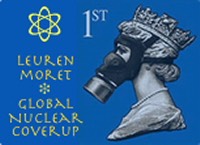


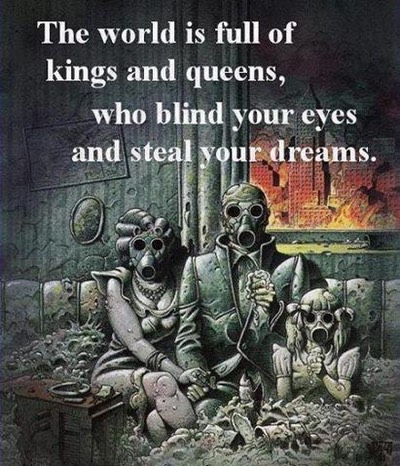
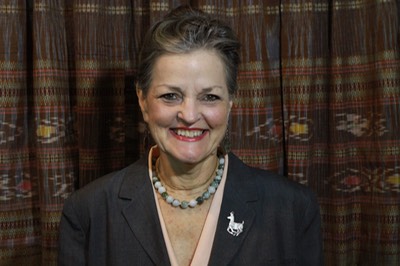
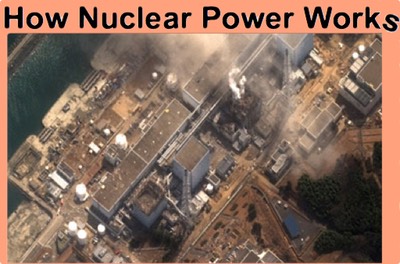
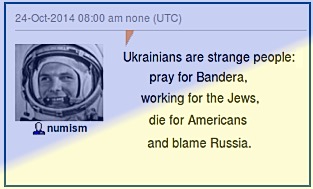
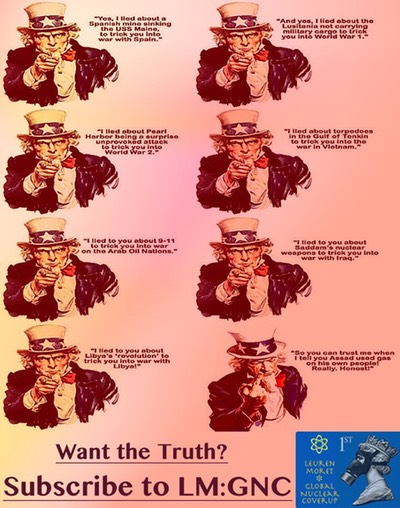
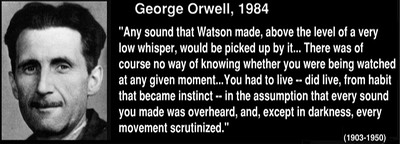
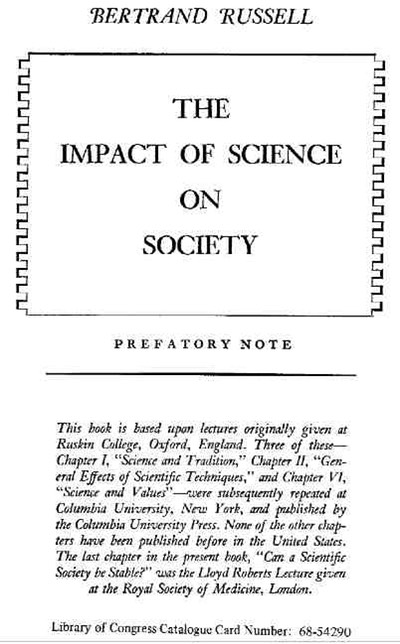
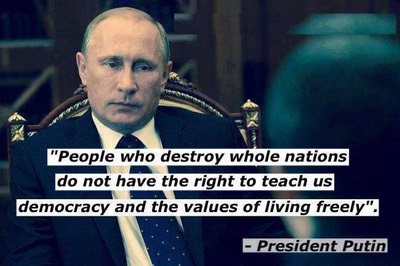
![20120724 - 7-24-2012 The More We Learn - quote from David Rockfeller -_thumb[2]](../../_Media/20120724---7-24-2012-the_med_hr.jpeg)
